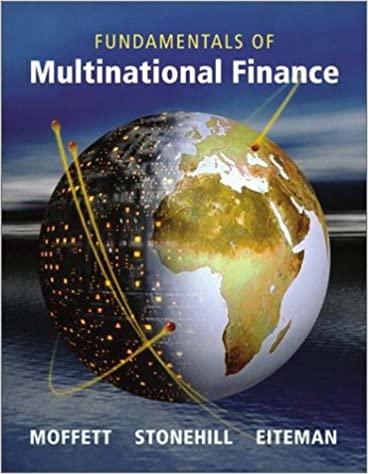Question
ABC imports special herbal oil from Morocco to the U.S. The fixed operating costs are USD 300,000 per year. The contracted variable costs are MAD
ABC imports special herbal oil from Morocco to the U.S. The fixed operating costs are USD 300,000 per year. The contracted variable costs are MAD (Moroccan Dirham) 400 per gallon of oil sold. As a finance manager, you have decided to set the catalog price for the oil at USD 80 per gallon, which is good for one year. You are not sure about the quantity of oil that ABC can sell in the coming year, but your best estimate is 50,000 gallons. Depending on the competition and the overall demand, the sale quantity can be as low as 10,000 gallons or as high as 90,000 gallons. For simplicity, please assume that the sale revenues as well as the costs will arrive at the end of the year.
MAD is pegged to a basket of two currenciesUSD and EUR. Your bank estimates that one MAD equals approximately USD 0.0234 plus EUR 0.0731. The spot exchange rates and the 1-year zero-coupon interest rates in different currencies are as follows:
Please note that the exchange rates (and below) are all presented in traders' convention so that USD/MAD = 8.000 means MAD 8.000/USD and EUR/MAD = 11.120 means MAD 11.120/EUR. Please also ignore the bid-ask spreads and assume that you can trade at these spot rates, and for this reason, no arbitrage would further imply that the exchange rate between USD and EUR is 11.120/8.000 = USD 1.390/EUR.
You think that the future exchange rate can be low (MAD 6.500/USD), medium (MAD 8.314/USD), or high (MAD 10.500/USD). You consider hedging your currency exposure using forward contracts and options. The ATMF call and put options on MAD (expiring in one year) both trade at USD 0.008 (per MAD).
Consider the low volume (10,000 gallons). Repeat your analysis in question (d). Please be reminded that (i) your hedge is based on the forecast volume and (ii) you need to change your zero impact costs to reflect the new volume scenario (so as to isolate the pure impact of exchange rate).
A. What is cell A?
b. What is cell B?
C. What is cell C?
D. What is cell D?
E. What is cell E?
F. What is cell F?
G. What is cell G?
H. What is cell H?
I. What is cell I?
Step by Step Solution
There are 3 Steps involved in it
Step: 1

Get Instant Access to Expert-Tailored Solutions
See step-by-step solutions with expert insights and AI powered tools for academic success
Step: 2

Step: 3

Ace Your Homework with AI
Get the answers you need in no time with our AI-driven, step-by-step assistance
Get Started


